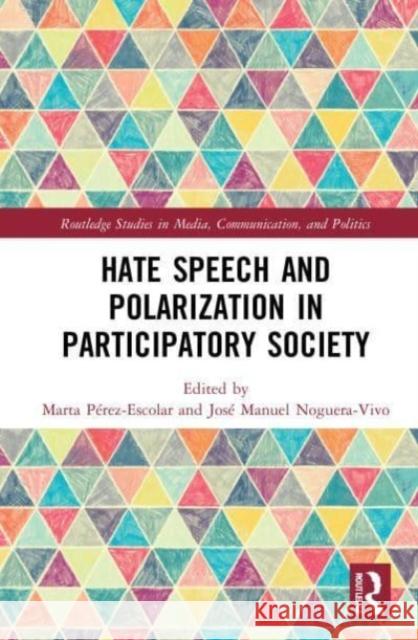Hate Speech and Polarization in Participatory Society » książka



Hate Speech and Polarization in Participatory Society
ISBN-13: 9780367626013 / Miękka / 2023 / 252 str.
Hate Speech and Polarization in Participatory Society
ISBN-13: 9780367626013 / Miękka / 2023 / 252 str.
(netto: 194,67 VAT: 5%)
Najniższa cena z 30 dni: 193,46
ok. 16-18 dni roboczych.
Darmowa dostawa!
This timely volume offers a comprehensive and rigorous overview of the role of communication in the construction of hate speech and polarization in the online and offline arena.
Wydanie ilustrowane
"This volume brings a whole range of colours in the black-and-white debate on technologies and participatory society. Both the cyber-optimistic views about a brave new Internet fuelled participatory democracy and the simplistic techno-fatalist criticism solely focused on data-driven corporations contribute to misguide the understanding of the complex social process that characterises media in the 21st century. Between these two extremes there is a necessary room for a rich comprehension of the entanglements amongst the new connectivities, the new flows of information and the social configurations that come along them. The state-of-the-art analyses included in this volume definitely contribute to relocate the discussion on hate speech and disinformation in the open, wide frame its complexity demands."
Juan Miguel Aguado, Full Professor of Media and Communication, Mobile Media Research Lab, School of Information and Media Studies, University of Murcia, Spain
"Hate Speech and Polarization in Participatory Society provides a timely perspective on core issues of contemporary society and culture. The lineup of authors is admirable and delivers a truly multi-national approach on the many facets and contexts of hate speech and polarization. Although hate speech is often practiced under the guise of free speech, it can in fact be used to impede deliberation and freedom of speech of others – These phenomena are not only dark sides of peer-to-peer social media, but exist also in political and media representations. The volume thus assembles a rich and many-sided perspective on hate speech and polarization, adopting realistic connotations of the potentials of participatory society."
Mikko Villi, Professor of Journalism Studies, Department of Language and Communication Studies, University of Jyväskylä, Finland
"This book is an astute volume that challenges preconceptions and informs perspectives on one of the most pressing issues of our time. Hate speech and polarization have significant consequences for society if they are left misunderstood and misrepresented. Cognizant that hate speech and polarization are global challenges, Hate Speech and Polarization in Participatory Society brings together a broad range of leading scholars from across the world to provide shrewd insights from diverse contexts. The edited collection is a nuanced intervention that unpacks the potential, promise and peril of participatory media."
Alfred Hermida, Professor of Journalism, Writing, and Media, University of British Columbia, Canada
1. Introduction to the Dilemmas and Struggles of Participatory Society; Part I: Contextualizing the Participatory Society: Metaphors for Polarization and Hate Speech; 2. How Did We Get Here? The Consequences of Deceit in Addressing Political Polarization; 3. Echo Chambers? Filter Bubbles? The Misleading Metaphors That Obscure the Real Problem; 4. Hate Speech and Deliberation: Overcoming the “Words-That-Wound” Trap; Part II: Political and Ideological Polarization; 5. ‘There Ain’t No Rainbow in the ‘Rainbow Nation’: A Discourse Analysis of Racial Conflicts on Twitter Hashtags in Post-Apartheid South Africa; 6. Blessed Be the Fight: Misogyny and Anti-Feminism in The Handmaid’s Tale; 7. Discursive Construction of Affective Polarization in Brexit Britain: Opinion-Based Identities and Out-Group Differentiation; 8. The Public Debate on Twitter in the Iberian Sphere: Comparative Analysis of the Characteristics in Portugal and Spain; 9. Towards a New Left-Populist Rhetoric in Turkey: Discourse Analysis of Imamoğlu's Campaign; 10. Anti-Immigrant Hate Speech as Propaganda: A Comparison Between Donald Trump and Santiago Abascal on Twitter; 11. Hate Speech and Social Polarization in Brazil: From Impeachment to Bolsonaro; Part III: Hate Speech in the Social, Traditional and Community Media; 12. Countering the Stigma of Homeless People: The Swedish Street Paper Situation Sthlm as a Counter-Hegemonic Voice for the Rehumanisation of Homeless People; 13. Hate Speech as a Media Practice. The Portray of Haters and Polarization in The Internet Warriors; 14. The Asylum-Seeker Discourse Fed by Political Polarization in Turkey: A Twitter-Based Analysis; 15. Orientalism and the Mass Media – A Study of the Representation of Muslims in Southern European TV Fiction: The Case of Spanish Prime-time TV Series; 16. Sports and Hate Speech Messages on Instagram: The Case of Seville FC in the Spanish League
Marta Pérez-Escolar is an assistant professor in the Department of Communication at Loyola University (Sevilla, Spain). She received the Civic Participation, Transparency and Good Governance PhD Extraordinary Award in 2018, awarded by the Region of Murcia (Spain). Her main lines of research are focused on civic participation, public opinion, political communication and information disorders.
José Manuel Noguera-Vivo is an associate professor of Journalism at UCAM, Spain, where he also is Head of Sciences Communication Department. His research emerges from the synergy of society, tech, and journalism. He is responsible of Spanish division of Online News Association and Science Communication Manager of the European project Interactive Narrative Design for Complexity Representations.
1997-2026 DolnySlask.com Agencja Internetowa
KrainaKsiazek.PL - Księgarnia Internetowa









